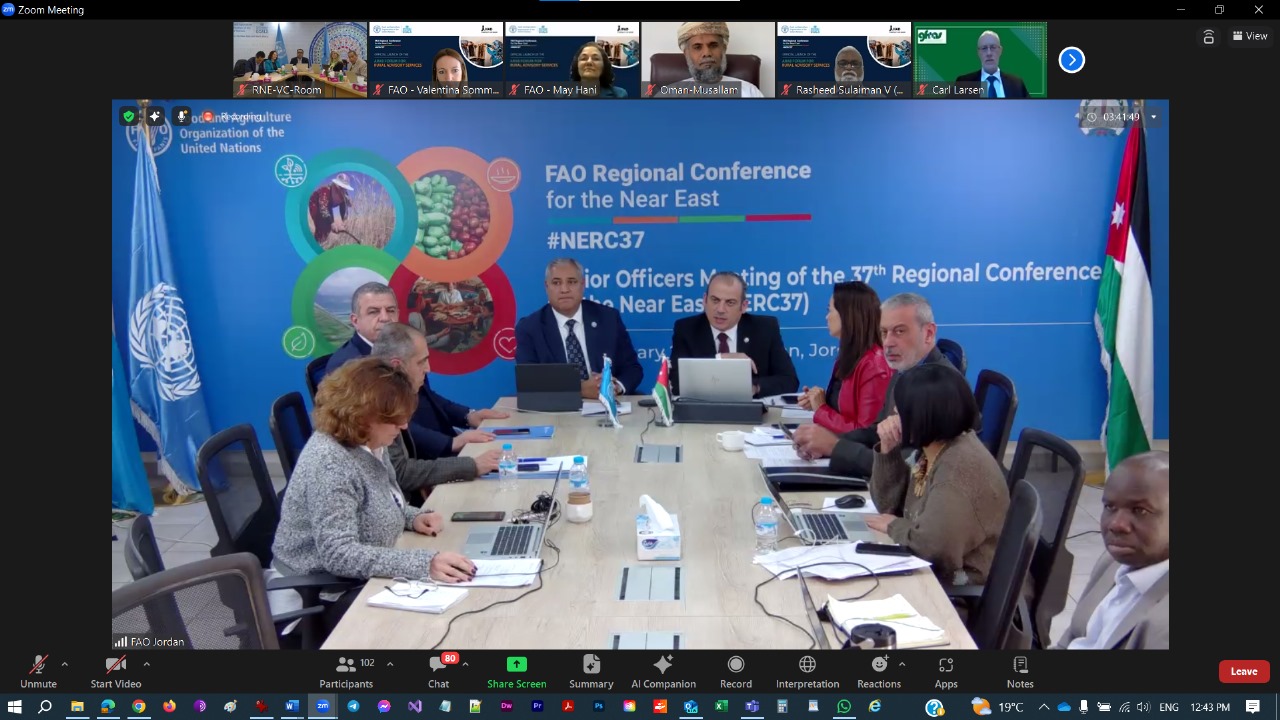FAO sets work priority for upcoming biennium as Senior Officer’s Meeting concludes
First segment of FAO 37th Session of the Regional Conference for the Near East (NERC)

The Food and Agriculture Organization of the United Nations (FAO), in the Near East and North Africa (NENA) has received concurrence from the Member States on the Programme Priorities for the 2024-25 biennium, focused on accelerating the transformation of regional agrifood systems to achieve sustainable agriculture development and food security and nutrition, amidst the poly-crises facing the region.
This consensus was reached after a four-day Senior Officer’s Meeting (SOM) that was concluded today with ministers of agriculture, partner organizations, and senior officials of member countries. The SOM is an important part of 37th Session of the FAO Regional Conference for the Near East (NERC37), to be concluded at the Ministerial Meeting on 4-5 March 2024 in Amman, Jordan.
Dr. Nizar Haddad, Director-General of the National Agriculture Research Center in Jordan, was elected as Chairperson of the SOM. The virtual event was attended by around 200 participants who elaborated on regional challenges and priorities in the NENA region through engaging roundtable and panel discussions to identify best practices to transform agrifood systems and achieve the Sustainable Development Goals. “In countries experiencing conflict, the rate of undernourishment was 23.6 percent in 2022, nearly four times higher than the 6.6 percent seen in non-conflict countries. Conflict remains an unavoidable catalyst for the worsening of an already fragile state of food insecurity and nutrition and that’s why a big portion of our capacity building work in this past biennium was dedicated to capacity building in conflict contexts. We have the solutions, the resources, and the collective commitment to really make a difference in this part of the world,” said Abdulhakim Elwaer, FAO Assistant Director-General and Regional Representative for Near East and North Africa. 
Engaging roundtable and panel discussions were held during the meeting provided a platform for in-depth exploration of critical issues facing the NENA region. Participants delved into regional challenges and identified key priorities related to agriculture, food security, and sustainable development. These discussions fostered knowledge sharing and highlighted innovative approaches to transform agrifood systems.
During the SOM, the member states agreed to discuss regional conflicts, highlighting the situation in Gaza, the Red Sea and Sudan. Members countries called on the need to ensure food security and nutrition in conflict areas and to protect agrifood systems and livestock, in the conflict-affected countries in general, but in Gaza in particular.
FAO held four dedicated discussions during the SOM to highlight pertinent regional issues. In one of the dedicate sessions, the strategic initiatives by FAO regional office were presented and appreciated by the member states, in particular the regional leadership development academy and the regional and country observatories on food security and nutrition. FAO highlighted the need for sustainable Water-Energy-Food Nexus approaches and practices at the farm, country, and the regional levels. Discussions also explored innovative financing modalities aimed at supporting Nexus efforts, contributing to the establishment of resilient water and food systems in the NENA region.
In a conversation with small-scale fisheries stakeholders from government and research, discussions highlighted how Illuminating Hidden Harvests (IHH) methods, findings and related activities can inform the understanding of national small-scale fisheries and contribute to improvements in policy, legislation, statistics and monitoring as well as targeted support and recognition of small-scale fisheries.
“On behalf of the Jordanian government, I extend my heartfelt gratitude to the delegates of the member countries who participated in the Senior Officers’ Meeting of the 37th Session of FAO Regional Conference for the Near East. It is with deep honor that I accepted the responsibility of chairing the sessions. The meeting was characterized by fruitful exchanges and robust strategic and technical dialogues, which will significantly enhance the recommendations to be presented at the upcoming ministerial meeting scheduled for March 4-5 in the Jordanian capital, Amman,” said Dr. Nizar Haddad, Director-General of the National Agriculture Research Center in Jordan
“Furthermore, I express my sincere appreciation to all the dedicated staff of the Food and Agriculture Organization, as well as the representatives of participating countries, for their invaluable and constructive contributions to the success of the meeting” Haddad added.
Additionally during the SOM, FAO, in collaboration with the International Fund for Agricultural Development (IFAD) and the Global Forum on Rural Advisory Services (GFRAS), launched the Arab Forum for Rural Advisory Services (AFRAS), working towards the acceleration of rural advisory services and inclusive and sustainable rural transformation. AFRAS is a regional collaborative network dedicated to advancing extension and rural advisory services across Arab countries. It aims to foster networking, knowledge and information sharing and exchange of experience among RAS stakeholders from different sectors.
NER37 Ministerial Session
The second and final segment of NERC37 will be the Ministerial Session, which will convene in the host country Amman, Hashemite Kingdom of Jordan, on 4 and 5 March 2024. The Ministerial Session will gather high-level representation of government ministers and leaders from across the region to frame a regional agreement on the way forward and joint action to achieve a sustainable agrifood system making it more fit-for-purpose and to ensure food security for millions of the region’s population.
Contact
News and Media (+20) 2 3331 6000 [email protected]
